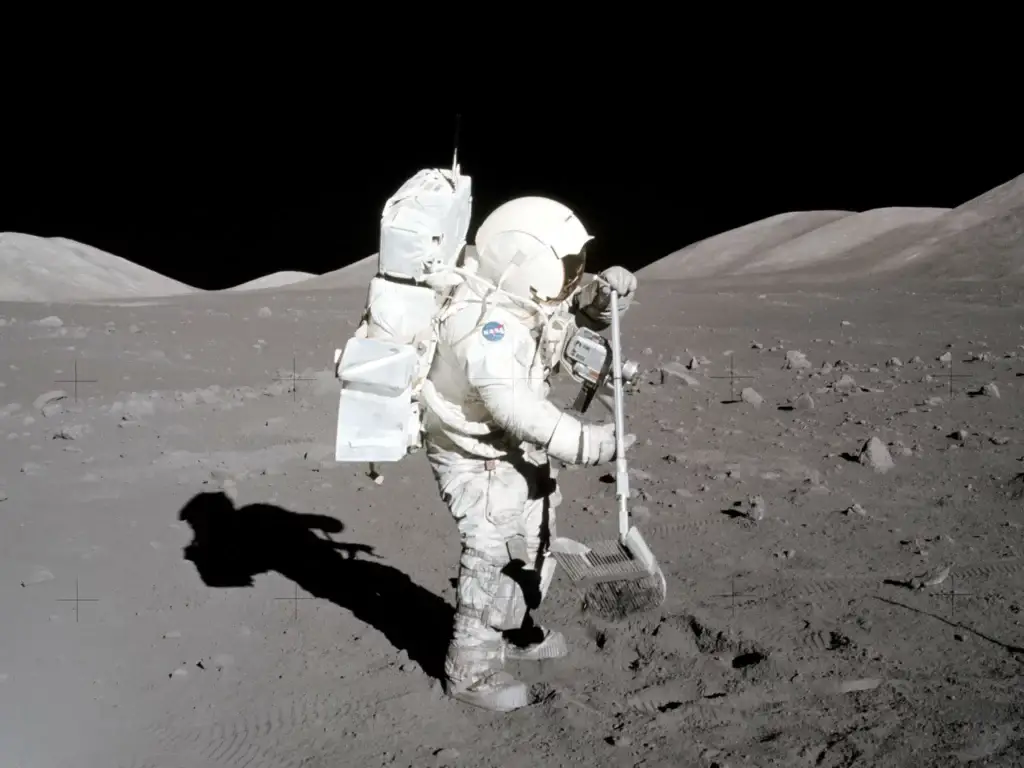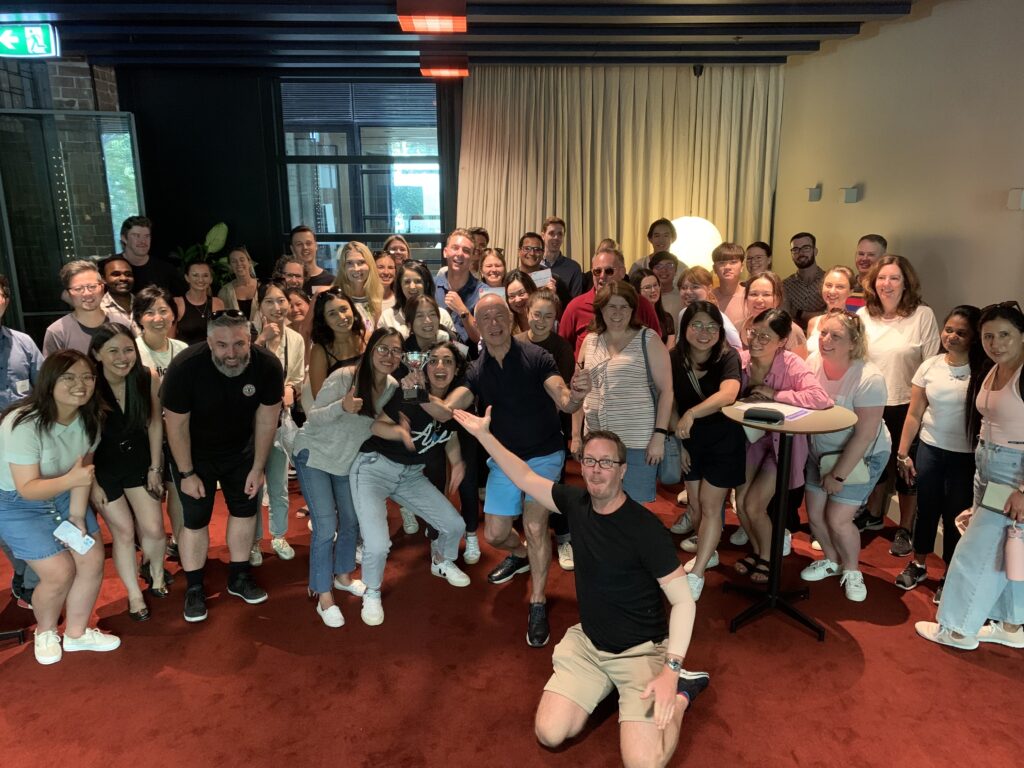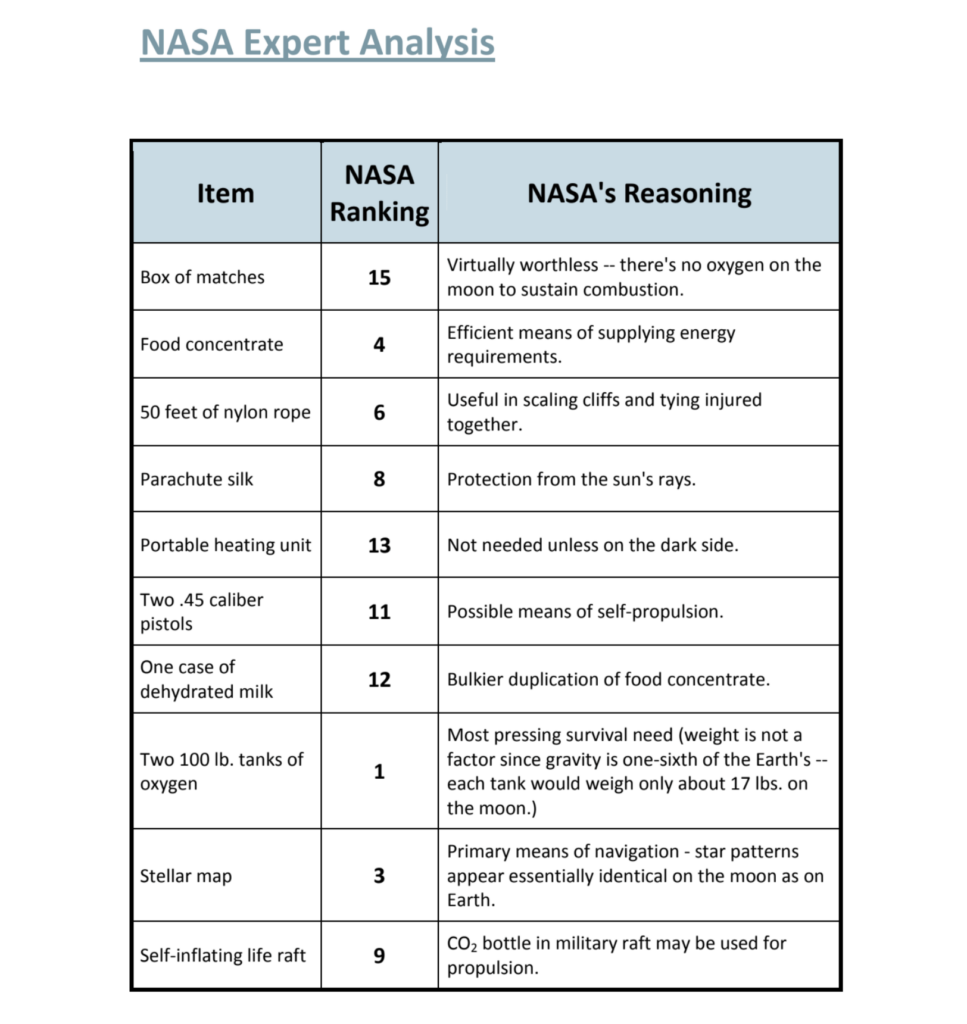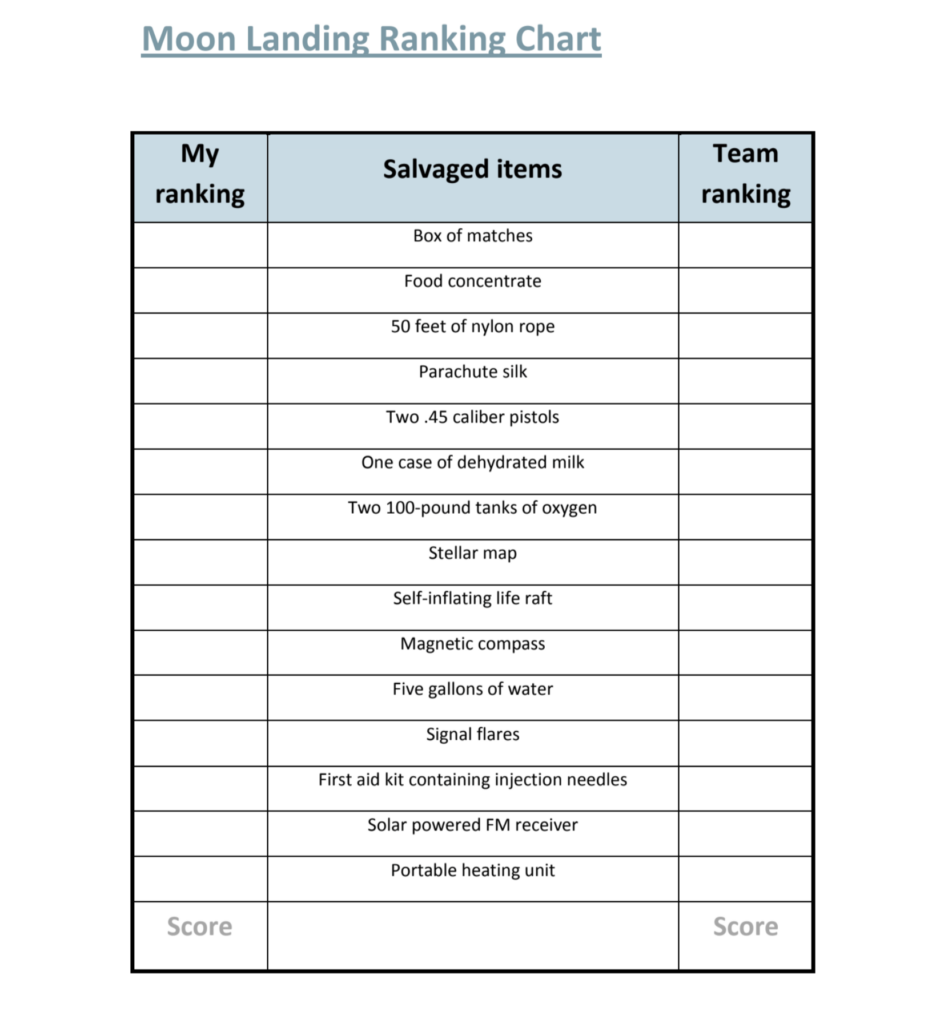The Ultimate Icebreaker: The Moon Landing
Get ready for an out-of-this-world team building experience with The Moon Landing! This fun and interactive activity will have your group reaching for the stars as they work together to problem solve and delegate tasks as a team.
Overview: The Moon Landing
As a member of a space crew, your mission to rendezvous with a mother ship on the moon’s surface has hit a snag. Mechanical issues forced your ship to land 200 miles away from the designated point. With vital equipment damaged during re-entry, your survival hinges on selecting the most critical items for the 200-mile journey to reach the mother ship. Among the wreckage, 15 intact and undamaged items remain. Your task: prioritise these items, numbering them from 1 to 15 based on their importance for your crew’s survival and successful rendezvous.
The fate of your crew’s mission rests on your ability to make strategic decisions under pressure. Every choice you make could mean the difference between success and failure, between reaching the mother ship or being stranded on the moon’s surface. Consider the functionality and necessity of each item, weighing their potential contributions to your journey. From life support systems to communication devices, every resource must be optimised to overcome the challenges ahead.
This scenario echoes the unpredictability and resourcefulness required in historical missions like the moon landing. Just as astronauts faced unforeseen obstacles and had to adapt to survive, you must navigate your own path to safety amidst adversity. Your decisions will shape the outcome of this mission, determining whether your crew can achieve the ultimate goal of rendezvousing with the mother ship against all odds.


Purpose: The Moon Landing
The Moon Landing Icebreaker serves as an effective tool for companies seeking to engage their teams and enhance high performance for several compelling reasons.
Firstly, the concept of a moon landing evokes a sense of excitement, adventure, and teamwork. By framing the icebreaker around a challenging and high-stakes scenario like a moon landing, participants are immediately drawn into the activity with heightened curiosity and enthusiasm. This heightened engagement sets the stage for meaningful interactions and collaborative problem-solving, fostering a positive and energized atmosphere within the team.
Secondly, the icebreaker promotes critical thinking and decision-making skills. Participants are tasked with prioritizing items for survival, mimicking the strategic decision-making processes required in real-world business scenarios. Through this exercise, teams learn to evaluate priorities, weigh trade-offs, and make informed decisions under pressure—all essential skills for driving high performance in the workplace.
Furthermore, the icebreaker encourages effective communication and teamwork. As participants discuss and debate their individual rankings, they must effectively convey their reasoning and perspectives to reach a consensus as a team. This collaborative dialogue fosters a sense of trust, cohesion, and mutual respect among team members, strengthening interpersonal relationships and enhancing teamwork dynamics.
The Moon Landing Icebreaker cultivates resilience and adaptability. Just as astronauts must overcome unforeseen challenges during a moon landing mission, participants must navigate unexpected obstacles and adjust their strategies accordingly. This experience builds resilience, fosters a growth mindset, and encourages innovation—qualities essential for driving high performance and thriving in today’s fast-paced business environment.
The icebreaker reinforces the importance of shared goals and collective success. By working towards a common objective—survival or successful mission completion—participants learn the value of collaboration, unity, and accountability. This shared sense of purpose instills a greater commitment to the team’s goals, driving motivation and enhancing overall performance.
The “Moon Landing Icebreaker” is a powerful tool for engaging teams and enhancing high performance in the workplace. Through its immersive and interactive nature, the icebreaker promotes critical thinking, communication, teamwork, resilience, and a shared commitment to success—all essential ingredients for achieving excellence in today’s competitive business landscape.


Instructions: The Moon Landing
- Moon Landing Madness Chart: Distribute a “Moon Landing Ranking Chart” to each member of your group.
- Personal Rankings: Give everyone 10 minutes to individually rank their choices on the chart, listing their preferences in the left-hand column labeled “My Ranking.”
- Group Discussions: Form groups of 3-4 participants and encourage them to discuss their individual rankings. As a team, refine the rankings based on collective thoughts and insights. Record the group’s final rankings in the second column labeled “Team Rankings.”
- NASA Expert Rankings: Present the official rankings compiled by NASA’s team of scientists and engineers. Compare both individual and group rankings with the expert rankings. Determine a score based on the differences between the two sets of rankings.
- Scoring: For each item, mark the number of points your score differs from the NASA ranking. Add up all the points, disregarding plus or minus differences. The lower the total, the better your score.
- Team Collaboration: Highlight the importance of teamwork in improving scores. Encourage participants to share thoughts and ideas to enhance group performance. Will their collective efforts be enough to achieve success and “survive”?
Get ready for a thrilling journey of collaboration, creativity, and friendly competition as your group embarks on the Moon Landing Madness challenge!
Materials: The Moon Landing


Scores
- 0 – 25: Excellent! Your crew’s survival skills are exceptional. Well done!
- 26-32: Good. Your results are above average. Congratulations on making it through!
- 33-45: Average. Despite some challenges, you managed to succeed in the end.
- 46-55: Fair. Survival was tough, but you made it out alive, albeit barely.
- 56-70: Poor. Unfortunately, not everyone made it back safely.
- 71+: Very Poor. Facing a grim reality, your team will spend eternity on the moon.
Debrief: The Moon Landing
In moments of high stakes, whether in the face of life-threatening situations or crucial organisational decisions, the ability to prioritise and make sound choices becomes paramount. Just as astronauts on a moon landing mission must carefully select the essentials to ensure their survival, teams in organisations must exercise critical thinking to identify what truly matters and delivers value.
The Moon Landing Team Activity offers a captivating and enjoyable way to underscore the importance of discerning genuine needs from mere desires. Participants are challenged to rank items based on their perceived importance for survival or success. Through this exercise, teams discover the significance of clear communication, collaboration, and sharing knowledge.
A fascinating insight emerges as teams engage in the game: while individuals may initially prioritise items differently, the collective wisdom of the group often leads to more effective rankings. This phenomenon highlights the indispensable role of communication and knowledge-sharing in achieving team success, akin to the collaboration required for a successful moon landing mission.
By experiencing the dynamics of decision-making in a simulated high-pressure scenario, participants gain valuable insights into the principles of effective teamwork and decision-making. They learn to navigate competing priorities, leverage diverse perspectives, and ultimately optimize outcomes for the collective benefit of the team.
Ultimately, the Moon Landing Team Activity serves as a reminder that in both life-and-death situations and organizational challenges, success hinges on the ability to prioritise wisely, communicate effectively, and collaborate harmoniously towards a common goal. Just as every decision counts in a moon landing mission, every contribution and collaboration count towards achieving organisational success and survival.
For more free team building games, icebreaker activities and team resources, subscribe to our monthly newsletter.

